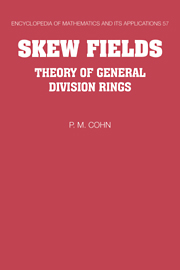Book contents
- Frontmatter
- Contents
- Preface
- Note to the reader
- Prologue
- 1 Rings and their fields of fractions
- 2 Skew polynomial rings and power series rings
- 3 Finite skew field extensions and applications
- 4 Localization
- 5 Coproducts of fields
- 6 General skew fields
- 7 Rational relations and rational identities
- 8 Equations and singularities
- 9 Valuations and orderings on skew fields
- Standard notations
- List of special notations used throughout the text
- Bibliography and author index
- Subject index
8 - Equations and singularities
Published online by Cambridge University Press: 05 November 2011
- Frontmatter
- Contents
- Preface
- Note to the reader
- Prologue
- 1 Rings and their fields of fractions
- 2 Skew polynomial rings and power series rings
- 3 Finite skew field extensions and applications
- 4 Localization
- 5 Coproducts of fields
- 6 General skew fields
- 7 Rational relations and rational identities
- 8 Equations and singularities
- 9 Valuations and orderings on skew fields
- Standard notations
- List of special notations used throughout the text
- Bibliography and author index
- Subject index
Summary
The theory of equations over skew fields is in many ways the least developed part of the subject. An element of an extension field whose powers are (right) linearly dependent over a subfield satisfies a rather special kind of equation (discussed in 3.4). More general equations are much less tractable, and in some ways it is more appropriate to consider singularities of matrices, a wider problem. Here we can limit ourselves to linear matrices, but even in this case there is as yet no comprehensive theory.
We begin by discussing the different possible notions of an algebraically closed skew field; although their existence in all cases has not yet been established, the relations between them are described in 8.1. We find that to solve equations we need to find singular eigenvalues of a matrix and this has so far been done only in special cases (discussed in 8.5). By contrast the similarity reduction to diagonal form requires the notion of left and right eigenvalues; it is shown in 8.2 that they always exist (in a suitable extension field) and 8.3 describes the reduction to normal form based on these eigenvalues. While this normal form (over an EC-field) is quite similar to the commutative case, there is no full analogue of the Cayley–Hamilton theorem (owing to the lack of a determinant function), although such a result exists for ‘skew cyclic’ matrices (i.e. matrices A such that xI - A is stably associated to a 1 × 1 matrix) and is presented in 8.3.
- Type
- Chapter
- Information
- Skew FieldsTheory of General Division Rings, pp. 366 - 419Publisher: Cambridge University PressPrint publication year: 1995



